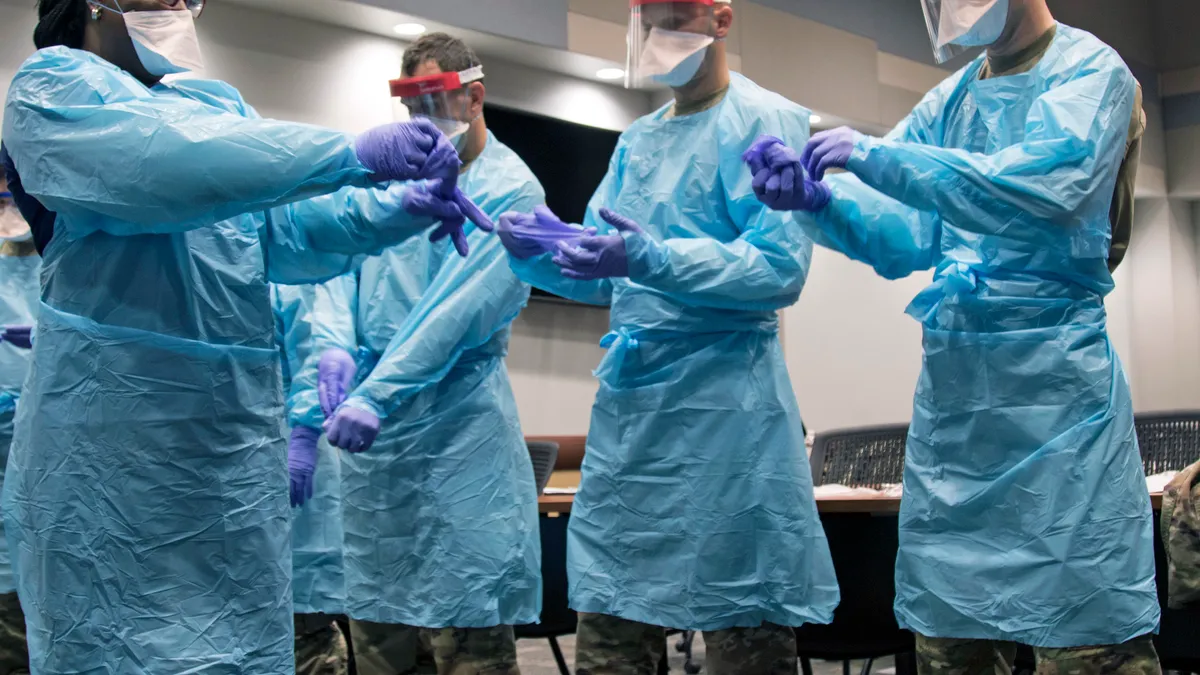Dive Brief:
- HHS' Biomedical Advanced Research and Development Authority said Tuesday it is working with MBio Diagnostics on development of a serology test that can provide a quantitative assessment of a patient's anti-SARS-CoV-2 antibody levels. Current FDA-authorized serologic assays are qualitative, meaning results are simply positive, negative or indeterminate.
- The $629,595 contract from BARDA will help MBio complete development of its antibody test and apply for FDA emergency use authorization to enter the U.S. market, the Boulder, Colorado-based company said. MBio is currently finishing validation experiments and expects to file the EUA in July, with plans to submit a full 510(k) at a later date, a company spokesperson told MedTech Dive in an email.
- It's the latest of many BARDA investments in COVID-19 antibody tests, despite other federal agencies' public questioning of the current value of antibody tests given limited understanding of the protection against disease they may offer.
Dive Insight:
Unlike viral detection methods that diagnose active infection, antibody tests, also known as serologic tests, determine whether a person was infected in the past by detecting the presence of antibodies, or proteins produced in the blood by the immune system to help neutralize the virus. Existing FDA-authorized serologic tests are qualitative, used in part to measure population prevalence.
Quantitative serology tests hold the promise of assessing whether a patient has protective levels of IgG neutralizing antibodies, and if the levels are high enough to enable the donation of convalescent plasma, which is being studied as a treatment to boost the ability to fight the virus in severely ill patients.
MBio's COVID-19 antibody panel measures both IgM antibodies, which indicate infection likely occurred within the past 30 days, and IgG antibodies, which can be measured 10 to 14 days after symptoms appear and may provide some protection from re-infection.
While MBio's initial product will deliver qualitative results for IgG and IgM, the company's LightDeck Analyzer collects quantitative fluorescence data. When the CDC and World Health Organization provide guidance on concentrations of antibodies that confer immunity, MBio will be able to deliver that information in a point-of-care system, the spokesperson said.
The test is designed to provide results in five minutes and allow screening in non-professional settings such as a drive-through or walk-up testing site.
BARDA's growing list of collaborations with industry to develop COVID-19 medical countermeasures includes a number of partnerships focused on testing. Those projects include Ortho Clinical Diagnostics' qualitative test to detect IgG antibodies, OraSure Technologies' test to detect antibodies in oral fluid specimens that can be obtained at home, Siemens Healthineers' qualitative test to detect IgG and IgM antibodies, DiaSorin's immunoassay for qualitative detection of IgG antibodies, Hememics' point-of-care antigen and antibody diagnostics, and Nanomix's rapid mobile antibody test.
Mount Sinai Health System also has submitted a request to FDA for an EUA for quantitative use of its serologic test, to provide a numeric result for the concentration of neutralizing anti-COVID-19 antibodies in plasma.
FDA in May toughened requirements for coronavirus antibody tests, making EUA submissions a requirement for test developers, after health experts warned that many tests flooding the market weren't reliable.
The CDC has cautioned that the presence of antibodies cannot be used to determine an individual's immunity from SARS-CoV-2 infection. On Tuesday, a group comprising more than 300 scientists and clinicians from the federal government, industry and academia published a report on their recommendations for serology testing, emphasizing that the tests should not be used as a standalone tool to make decisions about personal safety related to SARS-CoV-2 exposure.










